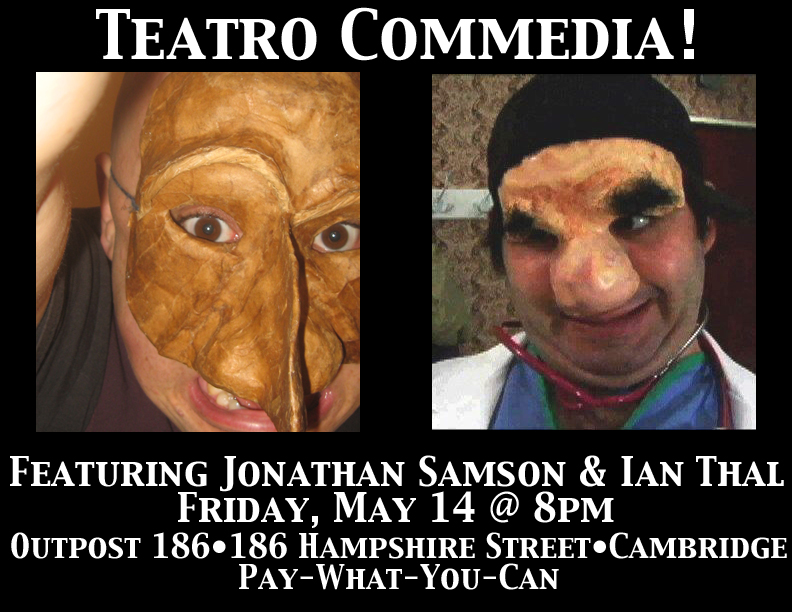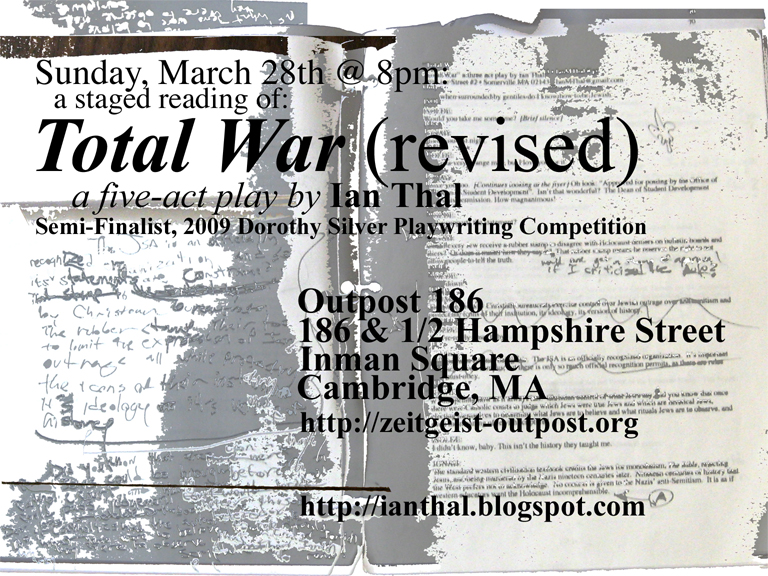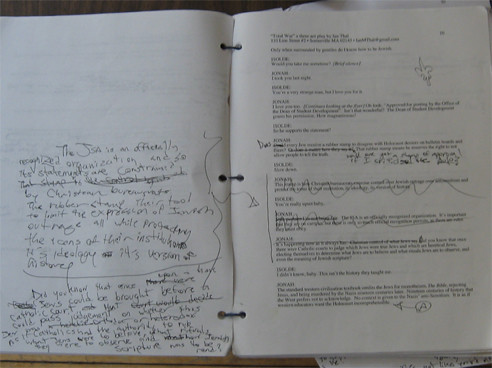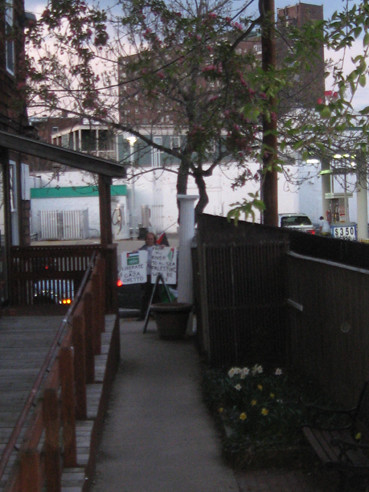 Cast from left to right: Lou Fuoco, Trudi Goodman, Tom Sprague, Anika Colvin-Hannibal, Savanah Shaughnessy, Daniel Schneider, Kendall Stewart, Mikey DiLoreto), Matthew Zahnzinger (sadly barely visible), and Kate Heffernan. Once again, I forget to take a lot of photographs.
Cast from left to right: Lou Fuoco, Trudi Goodman, Tom Sprague, Anika Colvin-Hannibal, Savanah Shaughnessy, Daniel Schneider, Kendall Stewart, Mikey DiLoreto), Matthew Zahnzinger (sadly barely visible), and Kate Heffernan. Once again, I forget to take a lot of photographs.
And now for the post-reading analysis.
The event received blurbs from Art Hennessey's Mirror up to Nature as well as from Thomas Garvey's Hub Review. Garvey was good enough to point out that:
The topic is a fascinating one - the legacy of Catholic anti-Semitism on a very Boston-College-like campus that is, of course, not, not Boston College.
Garvey is correct: The student newspaper in the play does not even have the same name as any Boston College student publication and due to my utter lack of imagination, I did not even bother to name the school in the play. Though many theatre artists have an antagonistic relationship with critics, as we see, critics fulfill an important function clarifying such misunderstandings that the audience might have. The notion that a graduate of Boston College might write a play set at Boston College, while an easily made error, is clearly ludicrous when examined with a critical eye.
But on to the evening's main event:
Unlike last time, there was not an
inarticulate Hamas supporter accosting actors and audience members as they approached (a friend reports that
Rolde has also been absent from his usual activities loudly denying war-crimes in Darfur.)
However, we were not without minor crises of a more theatrical nature. John M. Costa was called away at last moment; and thankfully, though it amounted to unconventional casting,
Trudi Goodman was on hand. Trudi was already reading the small role of the unnamed campus police officer, but was up for the role of Richard Doncaster, Dean of Students. The the result was plenty of unintentional comedy as actors either did or did not improvise around the changed gender of the actor! Trudi was great, by the way, and I really need to think about writing roles for her to play if I'm going to continue with this playwright thing.
As the audience filled in, and we waited for a couple of late arriving actors, I noticed a far larger turn out than the last reading. In fact, every seat in the room was filled and I even gave up my seat and spent most of the time perched on a coffee table in the back of the room.
I scribbled notes and corrections in the back as I read along with the actors. Though the play was only two pages shorter than the previous draft, the rewrites had made for a faster pace ("crisper" was the adjective used by some of the returning actors.)
I'm definitely much happier with this version, though I still feel that the pace seemed to slow down right in the middle-- not as much as with the previous draft-- but it's something I noticed. One audience member noted that including intermission, the run-time was two hours and twenty minutes and a that's too long in my mind for there to be a slow moment. The audience seemed divided as to whether the play was just a little too long or just the right length.
Another observation: I really need to put a pronunciation guide in the play. There are French, German, Hebrew, Latin, Polish, and Yiddish words and place names scattered throughout the script.
Most of the audience comments were positive though there were a few interesting questions:
One audience member wondered why at a Catholic school, why one of the key characters be so clearly identified as a lapsed-
Protestant (perhaps not so unusual in the United States, but the speaker had spent some years living in Ireland) yet she also gave me kudos for properly using the term "
deconstruction."
Another felt I should expand on my allusions to a certain Jewish prophet but also thought I should run the play by a Catholic theologian to make sure I am accurately representing doctrine. (Probably good advice, even though I did research the theology pretty carefully and did get an "A" in my Thomas Aquinas class in grad school.)
One of my young
commedia students asked if I plan to write a sequel. No plans for writing a sequel and no intention of revisiting the setting, but there are certain themes and even a character or two I might want to revisit.
One audience member took such a dislike to Donald (played by
Mikey DiLoreto) and attempted the argument that Donald was a supernumerary character. Mikey's job is safe though if for no other reason than some of the biggest laughs came from Donald's vulgar mouth, though the look on Mikey's face was priceless (sadly, I was taking notes at the time and so had pocketed my camera.)
Kate Heffernan (who played Edith) made this playwright very happy when she noted the revelation of the lack of a conspiracy which had been foreshadowed from the very first act-- despite the fact that Edith isn't in any of the scenes where this motif is brought up.
There were a number of other interesting side conversations between the actors and audience about the themes that the play explored but not necessarily about the the writing itself-- but interesting enough for me to ponder as as I consider rewrites.
Afterwards, people grabbed a few more bites of cheese and chocolate and cleared out. I was surprised that everyone shied away from the hummus.
Nika and I met several days later to go over the reading (it's useful to have the stage manager's opinions since she was more proximate to the actors during the reading than I) and we were able to unravel what differences were the result of a rewrites since the previous reading and which differences were the result of a change of certain cast members. We agreed that the
cutting away of extraneous material brought certain characters into sharper focus
I still need to tighten Act III.











